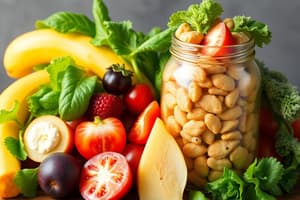Podcast
Questions and Answers
What percentage of energy expenditure does Basal Metabolic Rate (BMR) represent?
What percentage of energy expenditure does Basal Metabolic Rate (BMR) represent?
- 50-60%
- 80-90%
- 60-70% (correct)
- 70-80%
What is the formula to estimate BMR for a male aged 30-60 using Ismail's equation?
What is the formula to estimate BMR for a male aged 30-60 using Ismail's equation?
- 0.0550(w) + 3.112
- 0.0432(w) + 2.480
- 0.0550(w) + 2.480
- 0.0432(w) + 3.112 (correct)
What is the unit of measurement for BMR?
What is the unit of measurement for BMR?
- J/day
- kcal/day
- Watts
- MJ/day (correct)
What is the Harris-Benedict equation used for?
What is the Harris-Benedict equation used for?
What is the percentage of energy intake that thermic effect of food (TEF) is usually estimated at?
What is the percentage of energy intake that thermic effect of food (TEF) is usually estimated at?
What is resting metabolic rate (RMR) equivalent to?
What is resting metabolic rate (RMR) equivalent to?
What is the difference between BMR and RMR?
What is the difference between BMR and RMR?
What is the energy expenditure of a person who ingests 2000kcal on thermic effect of food (TEF)?
What is the energy expenditure of a person who ingests 2000kcal on thermic effect of food (TEF)?
What is the total daily energy expenditure (TDEE) for the individual described?
What is the total daily energy expenditure (TDEE) for the individual described?
What activity contributes the least to the individual's total daily energy expenditure?
What activity contributes the least to the individual's total daily energy expenditure?
How is the Total Daily Energy Expenditure (TDEE) calculated according to the provided content?
How is the Total Daily Energy Expenditure (TDEE) calculated according to the provided content?
In an energy balance context, what does a positive energy balance indicate?
In an energy balance context, what does a positive energy balance indicate?
Which of the following activities has the highest energy expenditure for this individual?
Which of the following activities has the highest energy expenditure for this individual?
What is the purpose of calculating energy intake?
What is the purpose of calculating energy intake?
What is the estimated daily calorie intake for a sedentary individual weighing 70 kg?
What is the estimated daily calorie intake for a sedentary individual weighing 70 kg?
How many grams of protein are recommended for an active individual weighing 75 kg?
How many grams of protein are recommended for an active individual weighing 75 kg?
If a bodybuilder weighs 80 kg, what is their recommended daily calorie intake?
If a bodybuilder weighs 80 kg, what is their recommended daily calorie intake?
What is the total energy (in kcal) derived from 100g of fat?
What is the total energy (in kcal) derived from 100g of fat?
What is the total protein intake for an individual consuming 2800 kcal, if they maintain the ratio of 1.8 g protein per kg for their body weight of 70 kg?
What is the total protein intake for an individual consuming 2800 kcal, if they maintain the ratio of 1.8 g protein per kg for their body weight of 70 kg?
Which nutrient provides the highest amount of energy per gram?
Which nutrient provides the highest amount of energy per gram?
An ultra-active person with a weight of 65 kg should aim for how many kcal per day?
An ultra-active person with a weight of 65 kg should aim for how many kcal per day?
What is the energy content in kcal for a diet consisting of 200g of carbohydrates and 50g of alcohol?
What is the energy content in kcal for a diet consisting of 200g of carbohydrates and 50g of alcohol?
Flashcards are hidden until you start studying
Study Notes
Energy Requirement
- Energy intake is the amount of calories contained in the diet.
- Energy expenditure is the sum of energy consumed by the body for physiological and biochemical functions (internal) and for physical activity (external work).
Estimating Energy Intake
- Layman: 25-30 kcal/kg/day
- Active: 30-35 kcal/kg/day
- Very active: 35-40 kcal/kg/day
- Ultra active: 40-60 kcal/kg/day
Energy Intake Based on Body Weight
- 60 kg: 2400 kcal/day, 108g protein, 480g carbohydrates
- 65 kg: 2600 kcal/day, 117g protein, 520g carbohydrates
- 70 kg: 2800 kcal/day, 126g protein, 560g carbohydrates
- 75 kg: 3000 kcal/day, 135g protein, 600g carbohydrates
- 80 kg: 3200 kcal/day, 144g protein, 640g carbohydrates
Nutrient Used During Exercise
- Energy in food is measured in calories (kcal)
- Calorie conversion from nutrients:
- CHO = 4 kcal/g
- Fat = 9 kcal/g
- Protein = 4 kcal/g
- Alcohol = 7 kcal/g
Energy Expenditure
- The sum of energy consumed by the body for physiological and biochemical functions (internal) and for physical activity (external work)
- Components of energy expenditure:
- Basal metabolic rate (BMR)
- Thermic effect of food (TEF)
- Thermic effect of activity (TEA)
- Non-exercise activity thermogenesis (NEAT)
Estimating Energy Expenditure
- BMR x PAL = kcal
- BMR: 60-70% of total energy expenditure
- Estimating BMR for Malaysian:
- Male (18-30 years): 0.0550(w) + 2.480
- Male (30-60 years): 0.0432(w) + 3.112
- Female (18-30 years): 0.0535(w) + 1.994
- Female (30-60 years): 0.0539(w) + 2.147
- Harris-Benedict Equation:
- For men: 66.5 + 13.8(weight in kg) + 5(height in cm) - 6.8(age in years)
- For women: 655.1 + 9.6(weight in kg) + 1.8(height in cm) - 4.7(age in years)
Resting Metabolic Rate (RMR)
- Represents BMR plus a small amount of additional energy expenditure associated with eating and previous muscular activity
- RER tends to be 10% greater than BMR
Thermic Effect of Food (TEF)
- 5-10% of energy intake
- Process of food digestion and absorption requires energy and produces heat
Studying That Suits You
Use AI to generate personalized quizzes and flashcards to suit your learning preferences.




